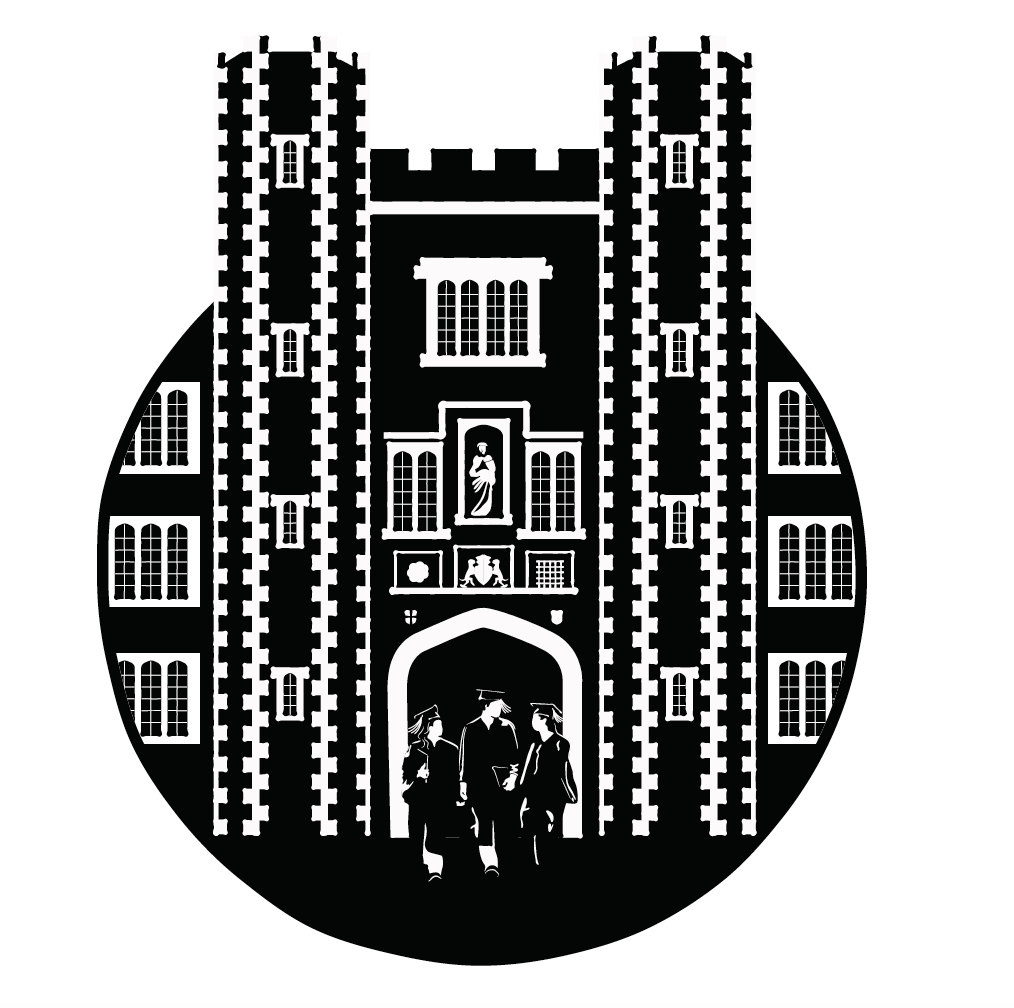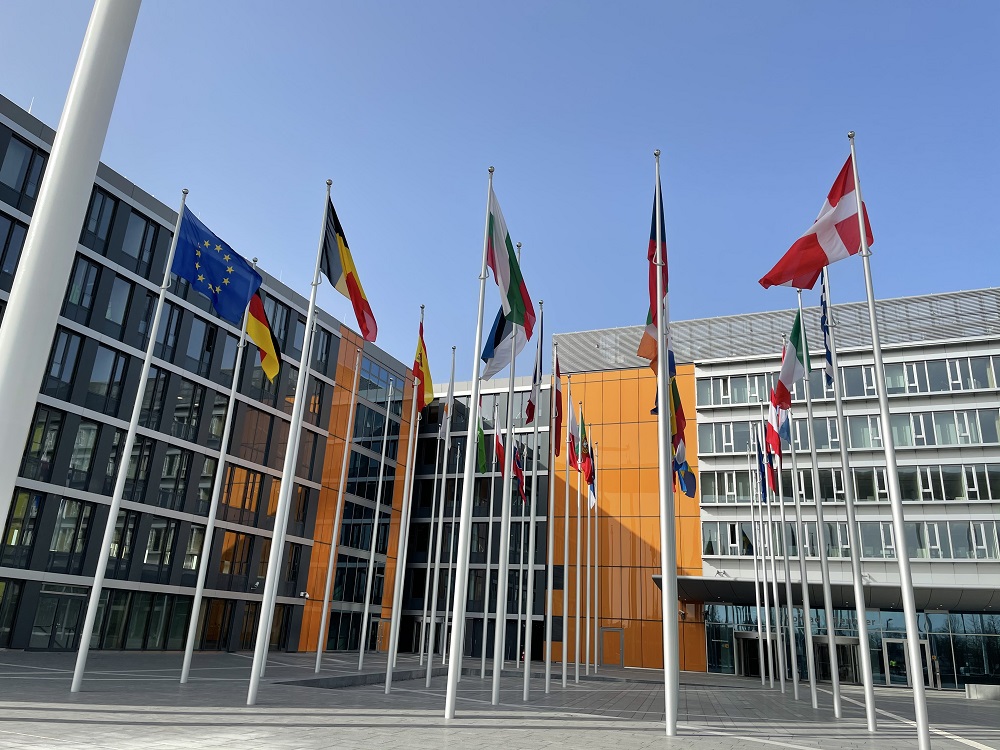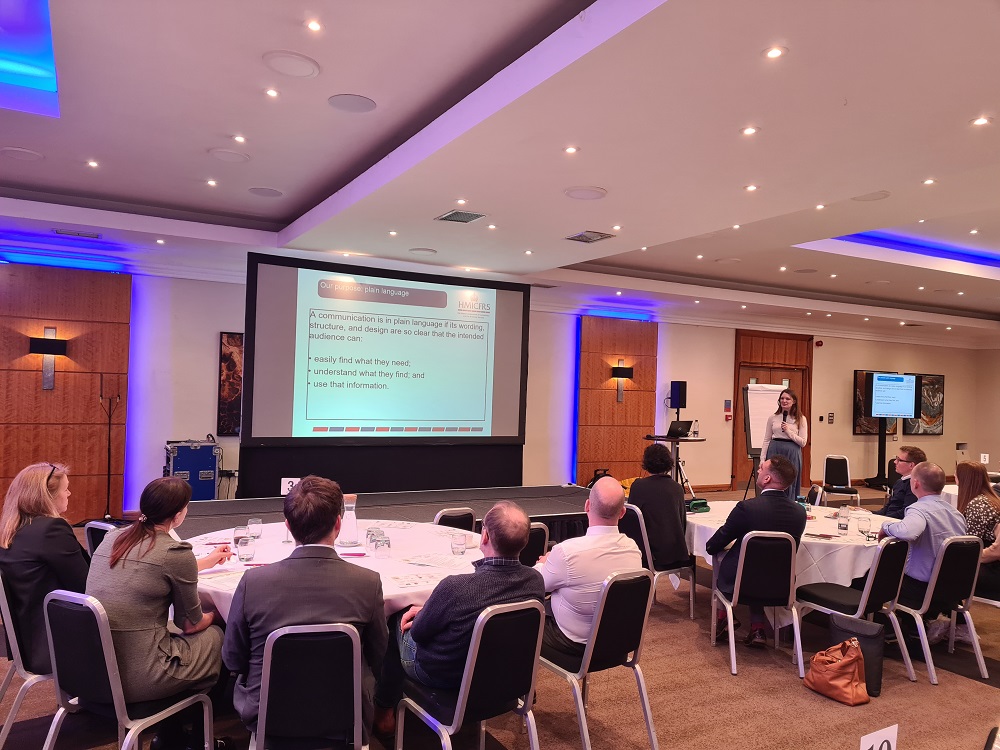
Formerly a translator and interpreter working at the European Parliament, Emily Bailey (2009) now leads a team of editorial staff at His Majesty’s Inspectorate of Constabulary and Fire & Rescue Services. Emily advocates for the use of clear and purposeful language and helps others to become more effective writers.
When I was growing up, I always wanted to be in a position where I could directly apply my language
skills to the wider good. And, as Editor-in-Chief of His Majesty’s Inspectorate of Constabulary and Fire & Rescue Services (HMICFRS), I’m lucky enough to have a role where promoting clear language goes hand-in-hand with making communities safer.

HMICFRS inspects police forces throughout England, Wales and Northern Ireland, and fire and rescue services in England. Our purpose is to make communities safer by providing authoritative information to the public about how well their local police force and fire and rescue service are performing. We also inspect and report on matters that may pose a risk to public safety. For example, in 2022 we published a report into vetting, misconduct and misogyny in the police service, and made a series of recommendations to strengthen the police service. We concluded that it was too easy for the wrong people to join and stay in the police and that standards needed to be higher.
Central to our work is the clarity of language. We don’t have hard power, as we aren’t a regulator. We only have soft power: the power of our voice – which is where my team’s work comes in. I lead a team of editorial staff to ensure that reports are written in a publiccentred way, our findings are clear and can’t be misinterpreted, and that we hold to account those who need it.
As a Modern and Medieval Languages (French and Spanish) graduate, I didn’t expect to get into policing and fire. Initially, I wanted to use foreign languages as a central part of my career and didn’t want my language skills to be a ‘nice to have’.

Shortly before graduating, I attended a presentation from the European Commission about the variety of work available as a professional linguist in European Institutions. I was attracted by the prospect of using foreign languages every day, as well as the pace and variety of work, and the chance to use my language skills to help leaders make decisions that would improve life for people in the EU.
I decided I wanted to become a conference interpreter and translator. So, after graduating, I spent a year working in Madrid to brush up on my Spanish and then trained as a conference interpreter and translator at the University of Bath. A year later, I was accepted to do a sixmonth translation internship at the European Parliament in Luxembourg, which I absolutely loved. I met people from all over the EU, made life-long friends and was trained by some of the best linguists on the planet. It was such a formative experience that I’m hugely grateful for.

I freelanced as an interpreter and translator for many years. I worked with French and Spanish, and a little with Italian and Portuguese later on. I started learning Polish to stretch myself, but I only got to GCSE level. I thoroughly enjoyed the role and the travel too. I went to places such as Rwanda, the USA, France, Spain, Belgium and Qatar. And I found myself in the weird niche of interpreting for the farming and football sectors. One of my strangest assignments was interpreting from French and Spanish to English at a tangerine festival in Turkey!
To be a good interpreter and translator, you have to be curious about the world around you, have a genuine interest in current events, be good with people, be flexible and have a sound grounding in all your languages. In particular, you have to have solid use of your mother tongue. This is because interpreters and translators usually only produce content from a foreign language into their mother tongue, and the quality of your output has to be high quality, idiomatic and easy to understand – essentially, it’s your product. This can be pretty hard to do, as we’re often taught at school to use long sentence structures and formal words to sound impressive. But the reality is that as a professional linguist you realise that most people just want things to be simple, and that language is a vehicle for understanding.

I absolutely loved working in translation and interpreting, but most of the work is freelance. After a while, the relentless need to market myself and be my own IT support and pay roll manager became difficult for me to handle. I therefore was delighted to be asked back to the European Parliament, this time as an Editor.
At the European Parliament, I worked as part of a team of native English speakers who edited documents to ensure their clarity and precision. These documents were translated into the 23 other languages of the EU, so we checked them first to make sure that the text was clear and there weren’t 24 different interpretations. Passionate about producing high-quality, idiomatic texts, this was a job I absolutely loved. It offered the perfect blend of using my foreign languages and English on a daily basis. Often, I’d receive a text in English that was written by a French person, and I would be able to work out exactly what they meant if they had written something in a particularly French way. I worked very closely with political groups, getting them to approve the texts, as well as Members of the European Parliament. I also gave drafting workshops to many different people throughout Parliament, helping them to raise the standard of their initial drafts.
Ready for a new role, I applied for a job at HMICFRS, where I now work. On a day-to-day basis, I make recommendations to senior leaders to use language that gets their point across more effectively. I also lead a team of editorial staff, encouraging them to make language choices that make our reports more media- and search-engine-friendly. Ultimately, plain language is what we’re after. Our reports do make the headlines and are designed to get the police and fire and rescue services to act. So, words really
do matter. Empathy is a central part of giving communications advice; often you are helping someone who may be struggling to articulate and who isn’t confident with language. You also have to see the bigger picture and consider how messages will be received by the media and stakeholders, as well as how they will perform on the web.
I also give sessions on writing clearly to retired police officers and firefighters, as well as civil servants. I love this part of my role as you can really see how the learning clicks. Most of these people have no experience in writing, and I often debunk a lot of writing myths that we’re taught at school – which they find hard to accept! For example, there’s absolutely nothing wrong with starting a sentence with ‘And’, ‘But’, or ‘So’ (which you’ll see I’ve freely done in this article). Sometimes, the oldest habits can be hardest to change, but these sessions are particularly rewarding. I love giving people confidence that, with just a few small tweaks, they can become better writers.

As for the future, I definitely see myself staying in language and communications more broadly. There’s a lot of work about AI and writing at the moment, and I’m really excited to learn more about it and the role it can play in promoting our messaging. Who knows where that’ll take me next?
Written by
Emily is Editor-in-Chief of His Majesty’s Inspectorate of Constabulary and Fire & Rescue Services, where she works to ensure the organisation’s outputs are clear, precise and informative. She was previously a freelance translator and interpreter and worked at the European Parliament.






